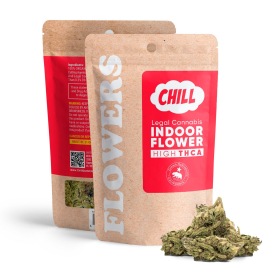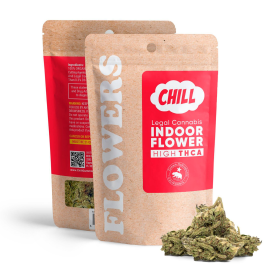THCA Products - Meet the Maker
If you’re into cannabis, or quite frankly, if you haven’t been living in an isolated cabin devoid of any access to human contact for the past couple years, you've probably already heard of THC, the most famous psychoactive compound in the plant.
You may have even heard of less popular cannabinoids, like delta 8 or THCP, but if you think you’re caught up with the latest developments in the world of hemp, you've got another thing coming. Enter THCA, a compound not quite well-known, especially in comparison to its evolution, THC. Let’s explore the brave new world of THCA products.
What is THCA?
THCA, short for tetrahydrocannabinolic acid, is commonly recognized as the precursor to THC. This cannabinoid acid is present in the fresh cannabis plant.
During the growth of cannabis plants, a variety of cannabinoids are generated based on the specific plant strain. Most of these cannabinoids initially exist as carboxylic acids, including THCA. They then transform into non-acidic compounds through a process called decarboxylation or "decarbing." The acidic form of each cannabinoid typically produces distinct effects compared to its decarboxylated counterpart.
The primary cannabinoid to develop initially within the plant is CBGA, often referred to as the "mother of all cannabinoids." It eventually breaks down to yield primary cannabinoids like THCA and CBDA.
Additional cannabinoid acids that may come across include:
- CBCA (Cannabichromenenic acid)
- CBGVA (Cannabigerovarinic acid)
- THCVA (Tetrahydrocanabivarinic acid)
- CBDVA (Cannabidivarinic acid)
- CBCVA (Cannabichromevarinic acid)
Unlike THC, THCA does not induce intoxication when ingested. Chemically, it possesses an extra molecular carboxyl ring that prevents it from binding to the brain's receptors responsible for producing the sensation of being “high."
You might wonder, "What's the point of THCA if it doesn't get me high?" However, without THCA, the existence of THC and the myriad of health benefits attributed to it would not be possible.
If you've ever seen that picture of KISS posing with their parents, you can think about it this way: Gene Simmons’ parents may be all normal and non-psychoactive, but rock stars like Gene (and THC) need to come from somewhere.
If you’re on the nerdier side, you can also think of THCA as Eevee, which eventually evolves into Flareon or Jolteon or whatever your favorite Eeveelution is, and although Eevee has its own cute little perks, all of its evolutions have a hell of a stronger kick.
The Million Dollar Battle: THCA vs. THC
The main difference between THCA and THC is that THCA doesn't make you feel high like THC does. But to turn THCA into THC, you need heat. You can do this by smoking, vaping, dabbing, or cooking with it. This process changes the THCA's structure by removing something called a carboxyl ring. This change helps THC work with CB1 receptors in our bodies, which leads to the high feeling.
THCA vs. THC: The Effects
THCA and THC have some similar effects. They can both help with nausea, but THCA seems better for fighting inflammation. On the other hand, since THCA doesn't make you high, it might not work as well for sleep as THC does. And while THC isn't usually recommended for seizures, there's a chance that THCA could be helpful.
How Does THCA Become THC?
To turn THCA into THC, you need heat and light. This process is called decarboxylation. It basically means that part of the THCA molecule is removed, and it becomes THC.
THC fits well into the CB1 receptors in our body's endocannabinoid system, which is why it makes you feel high. This happens because of its shape. But THCA doesn't fit as well, so it doesn't give you that high feeling.
When people smoke, vape, or cook cannabis, they use heat. This means that by the time the cannabis gets into your body, most of the THCA has turned into THC. So, if you smoke something with lots of THCA, it doesn't mean you'll get more THCA in your body – it will mostly be THC. This is why some methods of using cannabis, like making extracts or using it without heat, are needed to keep the THCA from changing into THC.
The Potential Benefits & Effects of THCA Products
Raw cannabis doesn't make you feel high unless it's heated first, a process called decarboxylation. However, you can still get some of the benefits of THC by consuming raw cannabis with its THCA content intact. For instance, you can juice raw cannabis or use products like THCA-based tinctures or edibles to get these benefits without getting high.
There are stories from individuals suggesting that THCA might have some effects, but its molecular structure prevents it from binding with CB receptors in our body's endocannabinoid system.
While there isn't enough data to confirm that THCA provides pain relief in the same way as THC, it still interacts with our receptors, albeit in a more indirect manner. Some studies indicate that THCA could have potential neuroprotective properties, which might help slow down or prevent neurodegenerative diseases like Huntington's disease. It's also been considered for treating conditions like colitis and irritable bowel syndrome (IBS). Initial findings even propose that THCA could be useful for seizure disorders.
The possible health benefits of consuming THCA could include:
- Reducing inflammation
- Decreasing nausea and improving appetite
One significant advantage of THCA is that all of these effects can be experienced without feeling high.
Are Higher THCA Levels Better Than Higher THC Levels?
The levels of THCA and THC in a cannabis product are key factors in understanding how strong it is and what kind of experience you'll get.
While a high THC number might seem good, too much direct heat can actually burn off some of the cannabinoids, leaving you wanting more.
Unless you're specifically interested in edibles, it's better to focus on high THCA numbers rather than just high THC numbers. THCA shows the full potential strength of what you're about to smoke, dab, or vape because it turns into THC. For products like flower, vape cartridges, or concentrates, you should check the THCA number. These products need heat to work properly and give you the desired high.
Using THCA
Many cannabis enthusiasts and patients use THCA that has been converted into THC as part of their daily routine. They achieve this by smoking, dabbing, vaping, or ingesting various forms of cannabis to either get high or manage their symptoms. In these instances, THCA acts as a means to access the benefits of THC. However, an increasing number of brands are recognizing the advantages of THCA on its own.
A popular and accessible way to use THCA is by consuming raw cannabis. You can simply eat it, but many people find it more effective and enjoyable to include it in a juicing regimen.
Does THCA Show Up on a Drug Test?
Indeed, both THC and THCA can trigger positive results on a drug test. When you smoke or take dabs, not all of the THCA present fully turns into THC through decarboxylation. Therefore, it's probable that you're also absorbing THCA in addition to THC. This holds true for certain types of rosin- and hash-based gummies, where cannabinoid isolation might be lacking. However, due to mandatory lab testing, the likelihood of this happening is reduced.
The Bottom Line on THCA
A precursor to THC, THCA has recently gained some traction in the cannabis community. Though it is not psychoactive like THC, THCA does have share many of the same potential health benefits with the psychoactive compound, making it perfect for those who want relief from nausea, limited appetite, and more without feeling buzzed.
Additionally, THCA can be converted into THC through a process known as decarboxylation, in which the compound undergoes heat and transforms into its descendant.
Curious about trying THCA? Give it a go today!
Read Less









